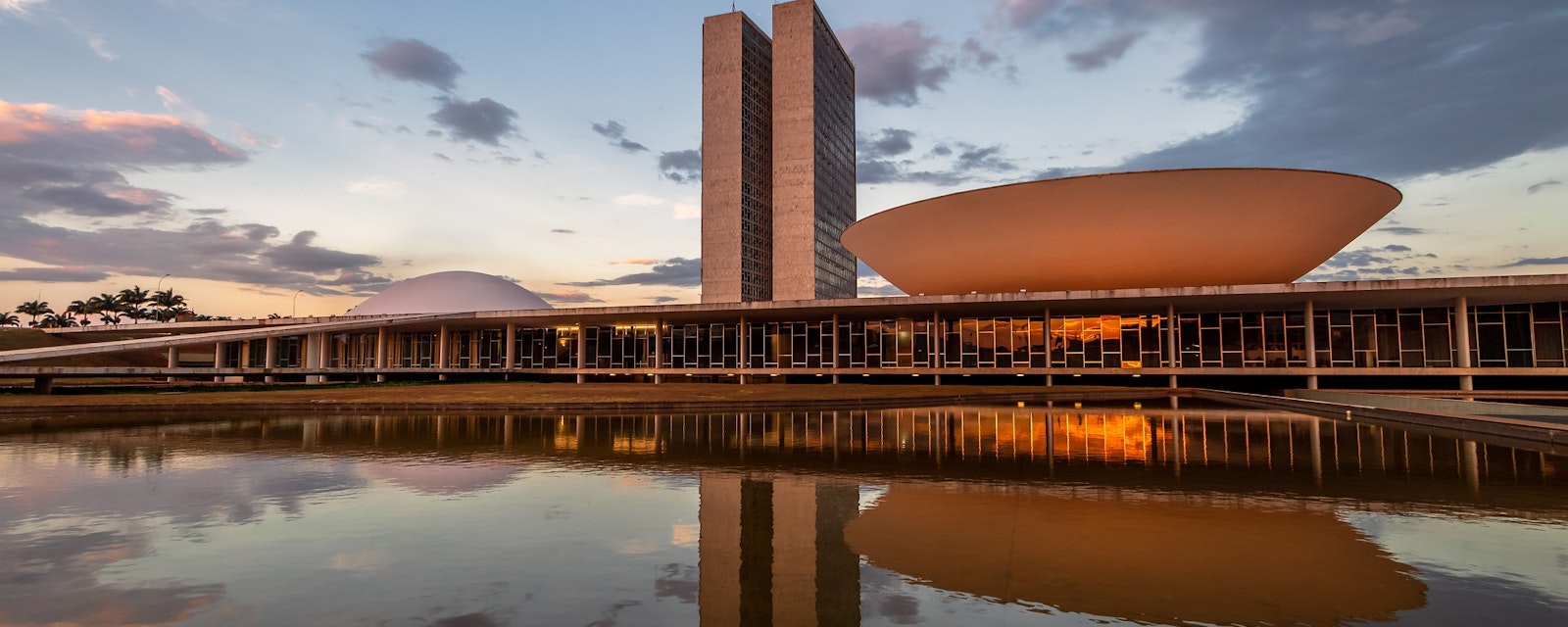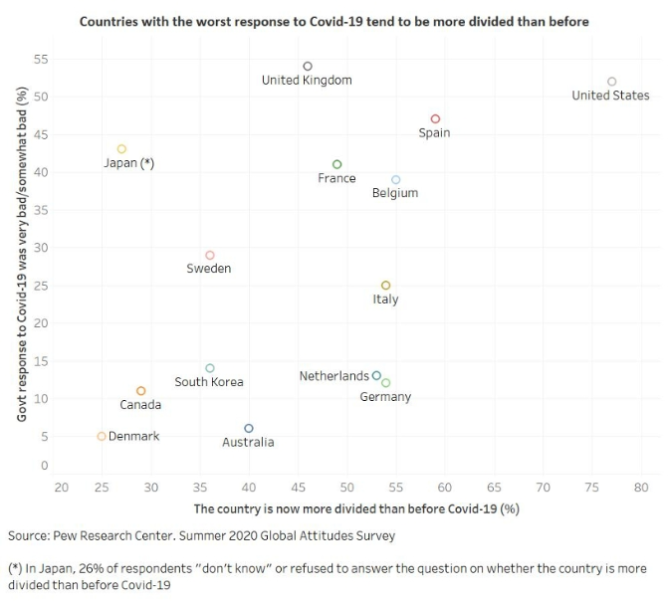In Japan, the Liberal Democratic Party has agreed on the format for selecting Shinzo Abe's successor. In Brazil, a new social program could be in the making. The normalization of relations between Serbia and Kosovo seems to be gaining momentum.
Meanwhile, Malaysia’s prime minister remains politically vulnerable, anti-government demonstrations could weaken the stability of the Bulgarian government, Mexico’s president will deliver the annual state-of-the-nation speech, and countries in West Africa are progressively resuming international flights.
Chart of the Week
In countries such as Australia, South Korea, Canada, Germany the government’s response to the coronavirus has been widely applauded by the public, while in others (US, UK, Spain, France) citizens are much more divided over this. The data also suggests that the current crisis could have accelerated previous political and societal trends in some countries, such as increasing levels of political polarization and social divisiveness. In the US and Spain, for instance, a majority of citizens believe that the country is now more divided than before, whereas in Denmark or South Korea most people think the opposite. The reemergence or deepening of political and societal divides increase the risk of policy stalemate at a time when difficult decisions have to be made.
What to Watch
Japan
The Liberal Democratic Party (LDP) has decided to hold a closed vote among lawmakers and prefectural chapter leaders to select Shinzo Abe's successor as LDP leader and prime minister. Younger lawmakers, however, had called for an open vote. Candidates will officially file on 8 September, and the vote will be held on 14 September. The Diet will convene on 16 September to select a new prime minister. The format will favor Chief Cabinet Secretary Yoshihide Suga, who has already lined up the support of the party's largest factions, making it difficult for his two rivals, Fumio Kishida and Shigeru Ishiba, to pull off an upset.
Brazil
President Jair Bolsonaro and allied congressional leaders will meet on 1 September to discuss the extension of the COVID-19 emergency assistance until the end of the present year. They will also discuss the creation of a new cash transfer program (“Renda Brasil”) beyond the pandemic. The government aims to include 15.2mn families in the program in 2021, compared to 13.2mn currently covered by the existing Bolsa Familia program. “Renda Brasil” aims to combine the current Covid-19 emergency assistance and Bolsa Familia. It was left out of the 2021 Annual Budget Bill sent to Congress on 31 August, so that efforts to find resources to pay for it will necessarily continue. Meanwhile, pressure to spend above the official inflation-limited budget ceiling is mounting as the government wants to approve a BRL 6.5 billion infrastructure package.
Serbia/Kosovo
International efforts to normalize Serbia-Kosovo relations are regaining momentum. US-mediated Serbia-Kosovo talks are scheduled to take place on 4 September in Washington DC, followed by an EU-led meeting on 7 September in Brussels. While details remain scarce, the negotiations in the US are expected to focus on economic aspects, and the EU-led talks should tackle political issues. For any agreement between Serbia and Kosovo to hold in the longer term, wide political and public support at home is crucial.
On the Horizon
ASIA
Malaysia
Prime Minister Muhyiddin Yassin remains vulnerable, not so much from the opposition, but from his own coalition allies. Muhyiddin was supposed to officially launch his ruling National Alliance (Perikatan Nasional, or PN) coalition on Saturday, 29 August. But the event was called off at the last minute, after the Malaysian Indian Congress (MIC) informed the registrar of political parties that it would not be joining the coalition. Until today, therefore, PN remains an unofficial coalition, six months after Muhyiddin took over as prime minister, and there are no signs that Muhyiddin is closer to consolidation.
EUROPE
Bulgaria
Prime Minster Boyko Borisov is facing an important week ahead, which may affect the stability of his government. A large anti-government demonstration in the capital Sofia is expected on 2 September. This demonstration may revive the dissipating protest momentum. Meanwhile, the start of the autumn session in parliament should reveal whether the ruling Citizens for European Development of Bulgaria (GERB) manages to secure backing from the absolute majority of deputies (120 out of 240) to initiate lengthy procedures to amend the constitution. Resurgence of protests and failure to advance the constitutional changes would significantly weaken Borisov's standing and may lead to his resignation.
LATIN AMERICA
Mexico
President Andres Manuel Lopez Obrador (AMLO) will deliver his annual state-of-the-nation address on 1 September. Expect polarizing rhetoric as AMLO moves into campaign mode ahead of the 2021 mid-term legislative elections, as well as a heavy emphasis on past governments’ corruption. AMLO is also likely to repeat last year’s mantra that there is a “technocratic obsession” with one-dimensional economic growth measures as he largely sidesteps the grim economic situation. Instead, AMLO will continue to extol the benefits of his flagship infrastructure projects. Despite the economic crisis and his government’s poor handling of the Covid-19 pandemic (599,560 cases and 64,414 deaths), AMLO’s approval ratings remain in the mid- to high-fifties.
MIDDLE EAST AND AFRICA
West Africa
Ghana and Nigeria are due to resume international flights on 1 September and 5 September, respectively. The two nations thus follow their West African neighbors Cote d’Ivoire and Senegal, which already reopened their air borders on 1 July and 15 July, respectively. All four countries had put international flights on hold since March. Official Covid-19 case figures and associated fatalities, though certainly still underreported due to insufficient test capacities, have remained low across West Africa, enabling regional governments to gradually scale back social distancing measures over the past two months.





